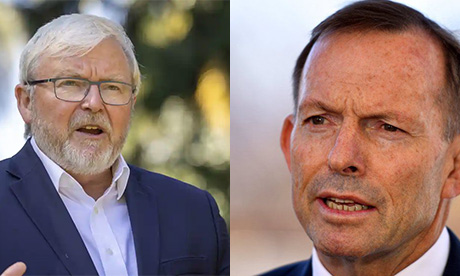Two former Australian Prime Ministers, Hon Tony Abbott and Hon Kevin Rudd join Australian Catholic University Emeritus Professor Greg Craven in a conversation about important issues facing Christianity and society.
Rudd and Abbott are longer prime ministers but both now serve the nation in other ways.
This conversation is to hear their views, as people of the Gospel, as Christians, on how they engage within the public life and society in Australia.
The conversation is in response to Craven’s book, “In the Shadow of the Cross”.
The host of the event is the Archbishop of Melbourne, The Most Reverend Dr Peter Comensoli.
In opening the conversation, Comensoli said that both Abbott and Rudd are men of faith who have given great service to Australia and in doing so have brought something of the life of the Gospel into their various roles.
The following is an introductory summary. The full video follows at the bottom of these introductory remarks.
Kevin Rudd
If you’re a person of Christian faith and therefore you are animated by the Gospel then it’s very difficult, and I think improper for us, to simply adopt a form of cafeteria Christianity; a smorgasbord Christianity where we just pick and choose.
If you’re alive to what is written in the Gospels; the challenges to our individual souls, our own individual salvation, our own individual relationship with God, these challenges are equally about our relationship with our fellow human beings and more broadly responsibilities for the creation itself.
Of course, if you want to anchor this in a core piece the New Testament it is simply the great commandment to love the Lord your God with all your heart and the soul and your strength, and love your neighbour as yourself; and on these two things hang all the law and the prophets.
For those reasons, for me, it has always been an inseparable question that if you are engaged in a spiritual relationship with your understanding of God on the one hand that it cannot be clinically separated from your responsibilities to your fellow human beings
Not just those physically next door, not just those who happen to be in the same town that you grew up in, not just those folks that you know or may form part of what modern society describes as the nation-state but in fact the tradition of Caritas and Catholic Care; regardless of whether we know these people personally or not.
The final thing I’d say is there is a debate, often in the public political process, about whether this responsibility for our fellow human beings; our brothers and sisters, whether that is a discretionary individual decision; that is an act of private charitable choice, or whether it is a responsibility through society acting through the common agency of politics to help look after our fellow human beings by that way through the proper provisioning.
For example, basic and elementary welfare basic and elementary health care basic and elementary education basic and elementary fundamentals for being a human being whose individual dignity is respected and for being a productive member of society maximizing their human individual and creative potential.

Tony Abbott
Obviously, I take religion seriously, although I don’t claim to be a particularly good Catholic.
But, I think the main job of religion is not to make us perfect but to make us better and obviously as better people we will bring something of that to public life.
I look at the public life that I’ve been part of, that there are lots of people in our public life who take their faith seriously and they cover a very broad political spectrum.
I think anything between the hard green left and the ultra-libertarian right is fertile ground for Christians.
This idea that Christian social teaching is able to say this specific policy rather than that specific policy; I’m just very sceptical about that.
So I think that the main role of the church when it comes to public life is encouraging more good people to go into public life encouraging people to be the best they possibly can be, but leaving the detail of policy whether we prefer more government or less government any particular situation, whether we think that there should be a greater focus on this issue or that issue in any particular situation
I think the what and how of any is best left to the people in public life rather than to be pontificated upon from the outside.
- Those keen to get to the content, the conversation proper begins at around the 4 minute mark.
- Video by Archdiocese of Melbourne.
- Narrative by in Flashes of Insight
News category: Analysis and Comment, Palmerston.





